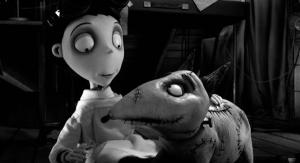Burton brings ‘Frankenweenie’ story back to life
While it may be the third animated, family-friendly horror-themed film to be released this season (preceded by "ParaNorman" and "Hotel Transylvania"), "Frankenweenie" was technically first to the gate.
"Frankenweenie" is actually based on a short created by Tim Burton for Disney when he worked for the studio in the 1980s. Much like its hero, the film's life was cut short when it was slapped with a PG rating and therefore could not be released, as planned, before a 1984 "Pinocchio" reissue (it seems the MPAA was totally cool with Pinocchio being kidnapped, caged, and threatened with destruction, losing his father, and nearly drowning, but a reanimated dead dog is taboo). It was subsequently slapped onto the studio's inferior "The Black Cauldron" the following year (and is now available on YouTube).
The director has the last laugh with this animated take on his short, which is not only the most Tim Burton-iest film to date, but also one of his most heartfelt homages to the genre from which he finds so much inspiration.
Set amidst the well-manicured suburbia known as New Holland (think an animated version of the "Edward Scissorhands" setting), young Victor Frankenstein (voiced by Charlie Tahan) is the prototypical Burton boy: smart, outcast, with a love of making movies and dabbling in science. As does many a young lad, he has a devoted pup by his side, Sparky, who usually accompanies young Victor on his adventures.
When Sparky meets the wrong end of a speeding car, Victor is devastated. His sorrow is momentarily lifted when he learns in science class that electricity can be harnessed to move a presumably dead object. Anyone who is even remotely familiar with the Shelley classic in any of its forms will know the outcome, but here, the most impressive elements of this take on the tale are the tiny flourishes included within.
Of course, the usual Burton cinematic inspirations can be found: "The Cabinet of Dr. Caligari," "Nosferatu," "Frankenstein." But the film also serves as a compendium of Universal monster movies, Japanese monster movies (particularly "Gamera"), Hitchcock, "Gremlins" and a few other for good measure. For more dedicated fans, you will also find a number of nods to previous Burton works such as "Pee Wee's Big Adventure" and "Batman."
Burton has taking a critical drubbing recently, with films such as "Planet of the Apes," "Dark Shadows" and "Alice in Wonderland" drowning his vision in a sea of excess. Here, he buries the irony and keeps it beautifully simple (sparse, Gothic-themed set design, black-and-white sets) and invests in the emotional aspects of the story - a boy and his dog. The supporting characters are just as welcome. For example, Victor’s classmates are not merely a collection of monster movie shout-outs, but a loopy lot of misfits that are each amusing in their own right, and his parents are loving and supportive, not merely clueless dolts.
Frequent Burton scribe John August also wrote the script for this newly minted version, and it’s ironically more human as a stop-motion animation film than it was as a live-action flick in its previous form.
“Frankenweenie” serves as a reminder of just why filmgoers fell in love with Burton in the first place: his playfulness, imagination and attention to tiny details. It’s all crafted in a style that is rich in texture, not just in its stop-motion animation, but in its heart.
















































